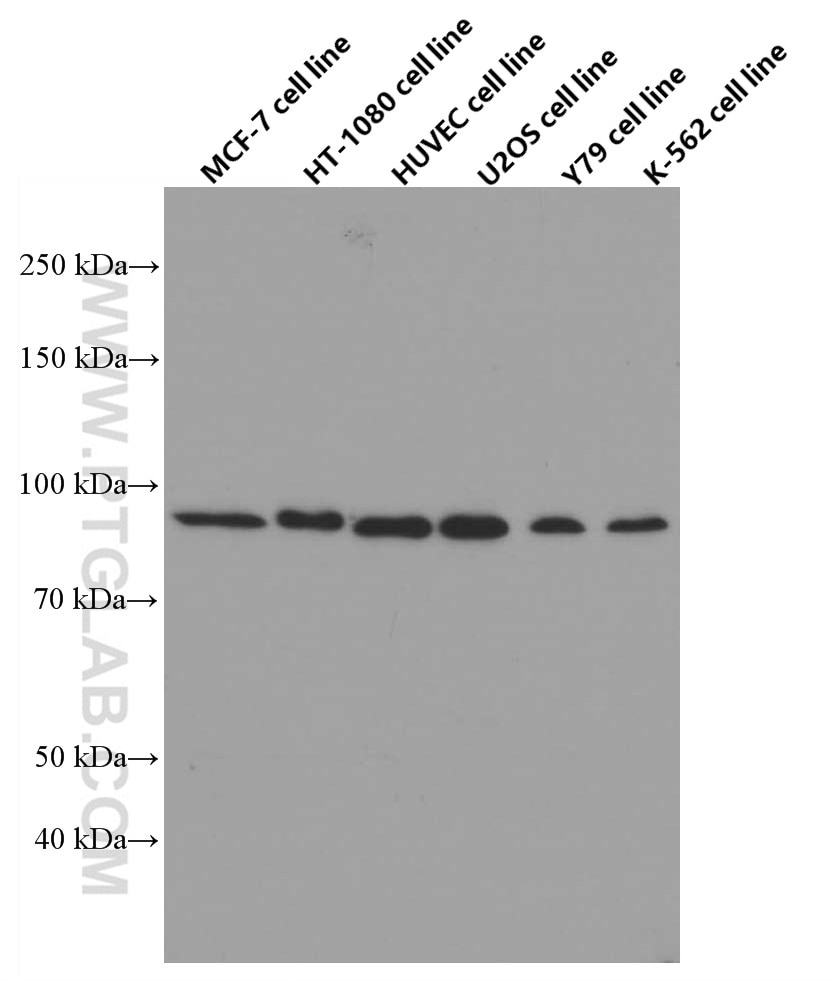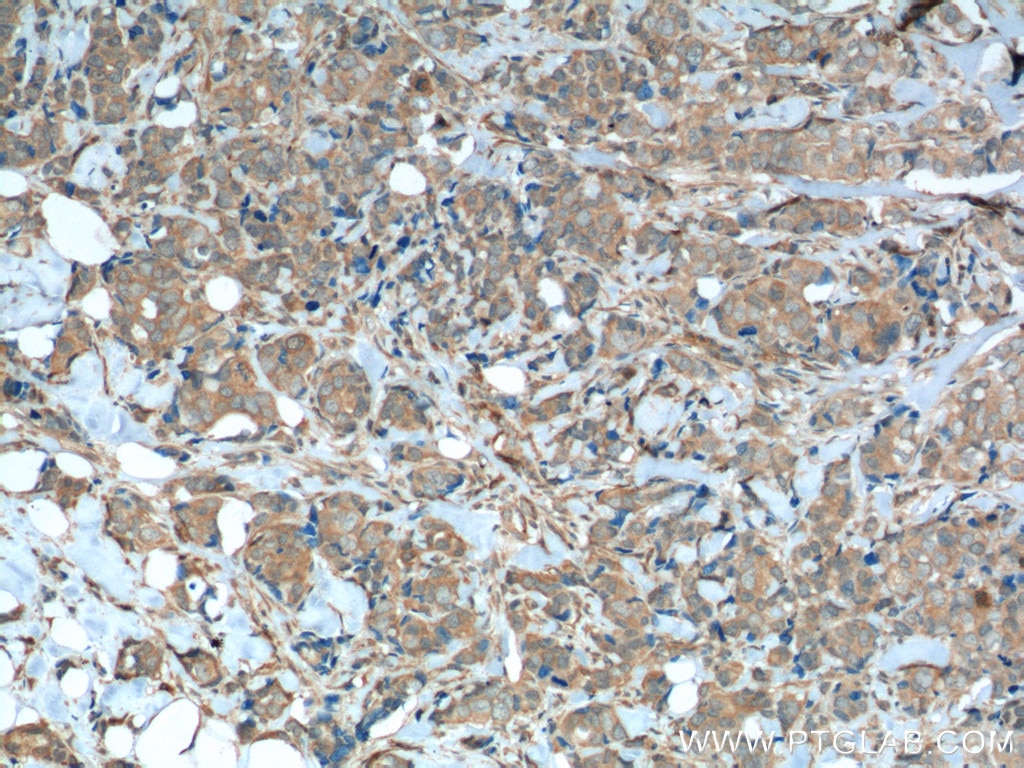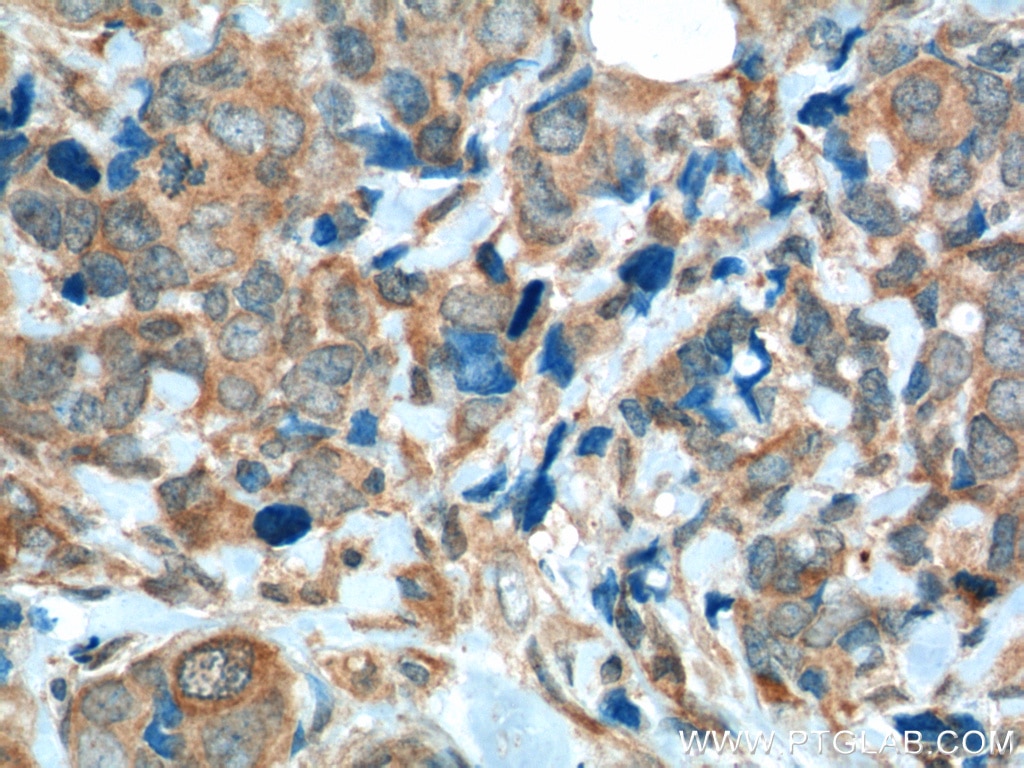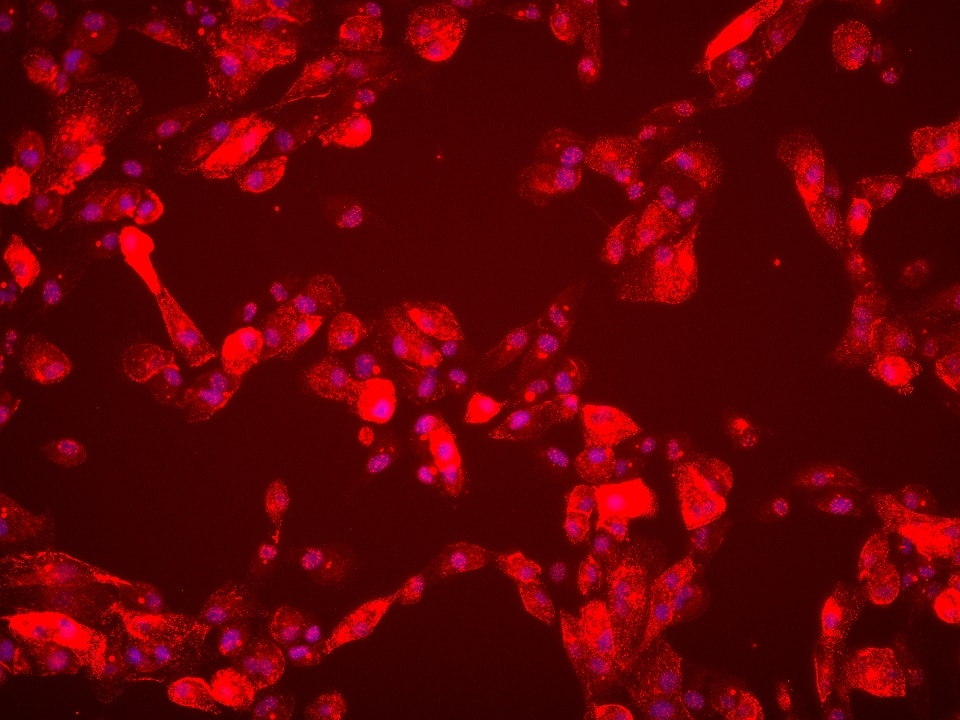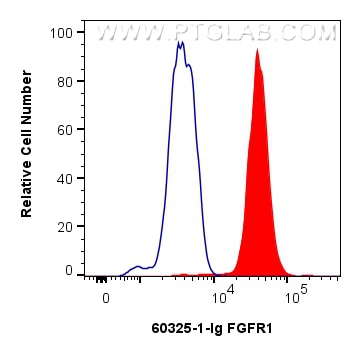Tested Applications
| Positive WB detected in | MCF-7 cells, HT-1080 cells, HUVEC cells, U2OS cells, Y79 cells, K-562 cells |
| Positive IHC detected in | human breast cancer tissue Note: suggested antigen retrieval with TE buffer pH 9.0; (*) Alternatively, antigen retrieval may be performed with citrate buffer pH 6.0 |
| Positive IF/ICC detected in | ACHN cells |
| Positive FC (Intra) detected in | K-562 cells |
Recommended dilution
| Application | Dilution |
|---|---|
| Western Blot (WB) | WB : 1:1000-1:3000 |
| Immunohistochemistry (IHC) | IHC : 1:50-1:500 |
| Immunofluorescence (IF)/ICC | IF/ICC : 1:500-1:2000 |
| Flow Cytometry (FC) (INTRA) | FC (INTRA) : 0.20 ug per 10^6 cells in a 100 µl suspension |
| It is recommended that this reagent should be titrated in each testing system to obtain optimal results. | |
| Sample-dependent, Check data in validation data gallery. | |
Published Applications
| WB | See 38 publications below |
| IHC | See 11 publications below |
| IF | See 3 publications below |
Product Information
60325-1-Ig targets FGFR1 in WB, IHC, IF/ICC, FC (Intra), ELISA applications and shows reactivity with human samples.
| Tested Reactivity | human |
| Cited Reactivity | human |
| Host / Isotype | Mouse / IgG2c |
| Class | Monoclonal |
| Type | Antibody |
| Immunogen |
CatNo: Ag3646 Product name: Recombinant human FGFR1 protein Source: e coli.-derived, PGEX-4T Tag: GST Domain: 471-821 aa of BC018128 Sequence: LPRDRLVLGKPLGEGCFGQVVLAEAIGLDKDKPNRVTKVAVKMLKSDATEKDLSDLISEMEMMKMIGKHKNIINLLGACTQDGPLYVIVEYASKGNLREYLQARRPPGLEYCYNPSHNPEEQLSSKDLVSCAYQVARGMEYLASKKCIHRDLAARNVLVTEDNVMKIADFGLARDIHHIDYYKKTTNGRLPVKWMAPEALFDRIYTHQSDVWSFGVLLWEIFTLGGSPYPGVPVEELFKLLKEGHRMDKPSNCTNELYMMMRDCWHAVPSQRPTFKQLVEDLDRIVALTSNQEYLDLSMPLDQYSPSFPDTRSSTCSSGEDSVFSHEPLPEEPCLPRHPAQLANGGLKRR Predict reactive species |
| Full Name | fibroblast growth factor receptor 1 |
| Calculated Molecular Weight | 820 aa, 91 kDa |
| Observed Molecular Weight | 91 kDa |
| GenBank Accession Number | BC018128 |
| Gene Symbol | FGFR1 |
| Gene ID (NCBI) | 2260 |
| RRID | AB_2881435 |
| Conjugate | Unconjugated |
| Form | Liquid |
| Purification Method | Protein A purification |
| UNIPROT ID | P11362 |
| Storage Buffer | PBS with 0.02% sodium azide and 50% glycerol, pH 7.3. |
| Storage Conditions | Store at -20°C. Stable for one year after shipment. Aliquoting is unnecessary for -20oC storage. 20ul sizes contain 0.1% BSA. |
Background Information
Fibroblast growth factor receptor 1 (FGFR1) is a tyrosine-protein kinase that acts as a cell-surface receptor for fibroblast growth factors. FGFR1 has been implicated in diverse biological processes including embryonic development, cell proliferation, differentiation, migration, and tumorigenesis. Mutations in the FGFR1 gene have been associated with Pfeiffer syndrome, Jackson-Weiss syndrome, Antley-Bixler syndrome, osteoglophonic dysplasia, squamous cell lung cancer, and autosomal dominant Kallmann syndrome. Alternatively spliced variants that encode different protein isoforms have been described.
Protocols
| Product Specific Protocols | |
|---|---|
| FC protocol for FGFR1 antibody 60325-1-Ig | Download protocol |
| IF protocol for FGFR1 antibody 60325-1-Ig | Download protocol |
| IHC protocol for FGFR1 antibody 60325-1-Ig | Download protocol |
| WB protocol for FGFR1 antibody 60325-1-Ig | Download protocol |
| Standard Protocols | |
|---|---|
| Click here to view our Standard Protocols |
Publications
| Species | Application | Title |
|---|---|---|
Nat Commun Interactome analysis reveals that lncRNA HULC promotes aerobic glycolysis through LDHA and PKM2. | ||
Int J Biol Sci PROTAC-Surufatinib Suppresses Pancreatic Neuroendocrine Neoplasms Progression by Inducing Ferroptosis through Inhibiting WNT/β-catenin Pathway Mediated by HMOX1 | ||
ACS Appl Mater Interfaces Hydrogel Loaded with Peptide-Containing Nanocomplexes: Symphonic Cooperation of Photothermal Antimicrobial Nanoparticles and Prohealing Peptides for the Treatment of Infected Wounds | ||
Theranostics Blockade of phosphotyrosine pathways suggesting SH2 superbinder as a novel therapy for pulmonary fibrosis. | ||
J Transl Med A novel intronic circular RNA circFGFR1int2 up-regulates FGFR1 by recruiting transcriptional activators P65/FUS and suppressing miR-4687-5p to promote prostate cancer progression | ||
Oxid Med Cell Longev DJ-1/FGFR-1 Signaling Pathway Contributes to Sorafenib Resistance in Hepatocellular Carcinoma. |
Reviews
The reviews below have been submitted by verified Proteintech customers who received an incentive for providing their feedback.
FH Xi (Verified Customer) (01-26-2026) | Nice product and it works well.
|
FH Reyes (Verified Customer) (09-30-2025) | FGFR1 (in green) did not seem to work on IF on human brain epileptic FFPE tissue, appearing as a halo around the nuclei instead of on the membrane.
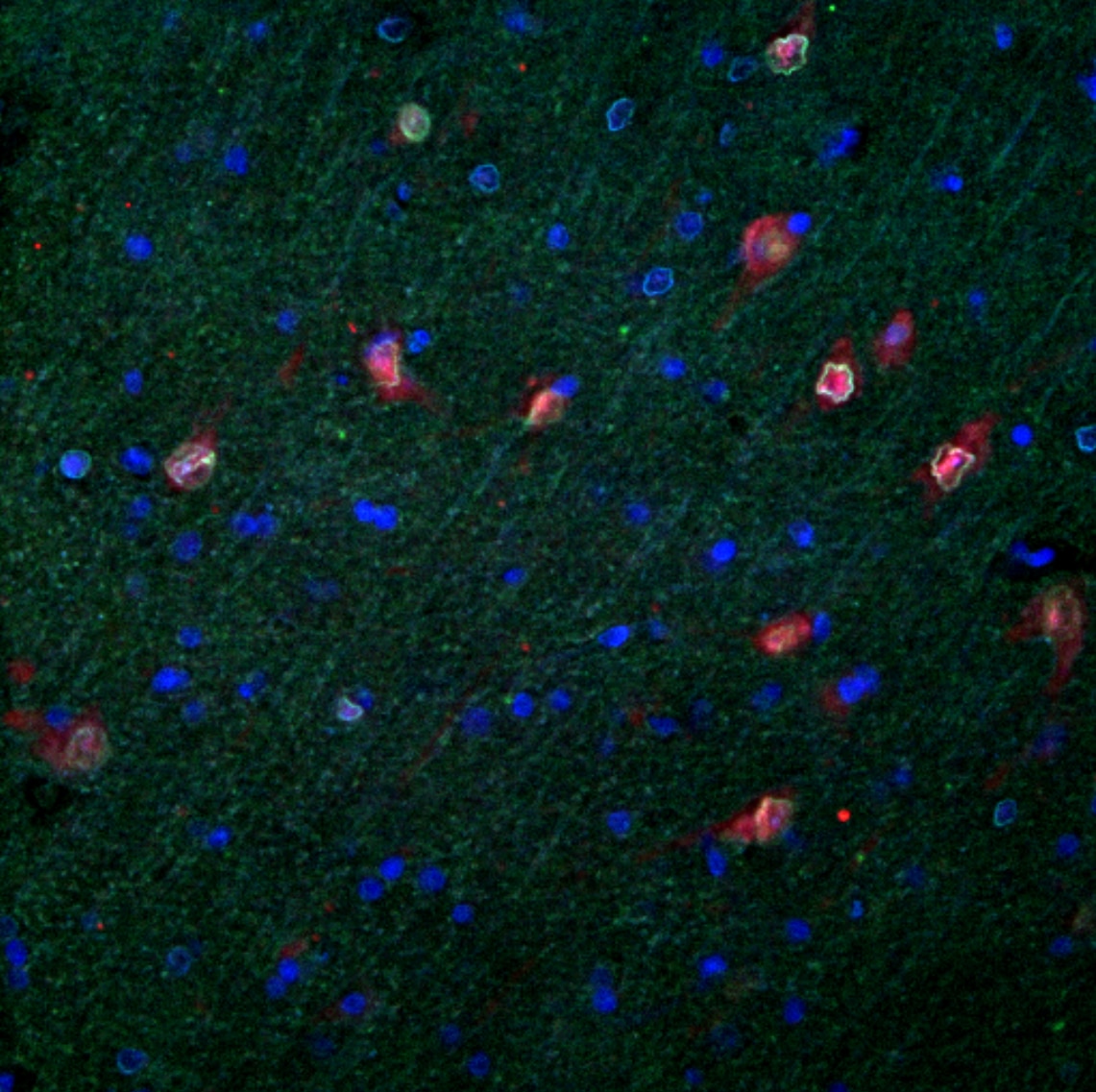 |

